Intermittent Fasting Workshop
Intermittent Fasting Workshop
What many people think Intermittent Fasting is
- Optimists: Magic Fat Burning Tool, Modern Day Medical Miracle, Can eat anything as long as I fast, The Absolute Best Diet
- Doubters: Starvation Mode, Slow Metabolism Down, Torture
What is Intermittent Fasting?
It's simply a method where you would designate a window of time when you eat and a window of time when you don't eat.
There are numerous health benefits that have been discovered using Intermittent Fasting but evidence based research is lacking in humans.
Therefore, we will solely be focusing on how to use Intermittent Fasting for weight management, specifically on how to lose weight.
Different Kinds of Intermittent Fasting
5:2 (Fast Diet)
- Eat normal for 5 days and on the other 2 days limit to 500-800 calories.
- Never do 2 low calorie days in a row.
Eat Stop Eat
- Similar to 5:2
- Fast once or twice a week abstaining from food for 24 hours.
- Eat normally on the other days.
- You can have zero calorie drinks (water, black, coffee, tea).
Warrior Diet
- Fast for most of the day and eat one big meal at night.
- You can still eat small snacks but the majority of your food will come at night.
16:8 (Lean Gains)
- Fasting window is 16 hours and eating window is 8 hours.
- Consume more carbs and less fats on workout days.
- Consume more fats and less carbs on rest days.
- Protein remains consistent.
This seminar focuses on 16:8 (Lean Gains).
The Facts
- Intermittent Fasting is NOT a magic tool.
- Intermittent Fasting is an alternative and preferential way to eat.
- Intermittent Fasting does NOT burn fat any better, faster or more efficiently than other diet methods.
- Intermittent is NOT starvation. If at any point you are feeling hungry, lethargic, moody the implementation is incorrect.
ALL DIETS WORK if implemented correctly!
The Law Of Thermodynamics
- Eat LESS than you burn consistently and over time and you will lose weight. This is called a Calorie Deficit.
- Eat MORE than you burn consistently and over time and you will gain weight. This is called a Calorie Surplus.
- Eat the SAME amount that you burn and you will stay the same weight. This is called Maintenance.
The science to losing weight is EASY.
It doesn't matter if you eat 1 meal or 10 meals a day, eat every 2 hours or once every 4 hours, if you are not in a deficit you will NOT lose weight.
While the science to losing weight is EASY, the implementation is NOT.
Why bother with Intermittent Fasting?
It is an extremely effective tool to help you stay in a calorie deficit. It allows you to consume your daily food and calories in a smaller eating window and gives you the opportunity to eat larger and more satisfying meals.
Remember Intermittent Fasting is NOT for everyone. It's simply a tool and it's a choice and preference. It is NOT a requirement if you want to lose weight.
Who it can work for naturally
- People who enjoy or prefer bigger meals.
- People who don't care for breakfast.
- People who are sedentary.
- People who are on the go.
Who it may not work for naturally
- People who don't like big meals.
- People who like to snack.
- People who are bulking or trying to gain muscle.
- People who are active throughout the day.
- People who train multiple times a day.
Who should consider it
- People who have a lot of social outings.
- People who get stressed eating with so many times of day.
- People who have limited calories to work with and want to lean down more.
Personal Experience
The words HUNGRY, HANGRY, STARVED do not exist in my vocabulary anymore.
Suggestions and How to Get Started
- Increase fasting time slowly and add an extra hour week by week until it feels comfortable.
- Drink water to help.
- Zero calorie drinks can act as appetite suppressants: black coffee, tea, sparkling water, zero calorie sodas.
- You can use a small fruit to help push your fast.
- Keep the same schedule.
How I Implement Intermittent Fasting
- Break the fast with Proteins and Fats as it helps me stay satiated, alert and doesn't bloat me or bog me down.
- End the day with Carbs as it helps me sleep.
- Carbs also carry over the next day for me which helps when I workout.
Examples of How to Allocate Food using 16:8
Assuming maintenance calories is 2000 calories and we only have these 6 items to work with
- 100 Calories (Banana)
- 200 Calories (Assorted Nuts)
- 200 Calories (Avocado)
- 200 Calories (Guinness Pint)
- 400 Calories (Chicken and Greens)
- 900 Calories (Steak and Fries)
Scenario 1: A typical day
Lunch at 12:00pm (600 calories total)
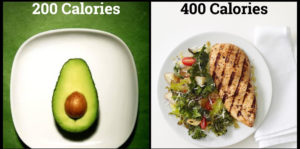
Dinner at 8:00pm (1400 calories total)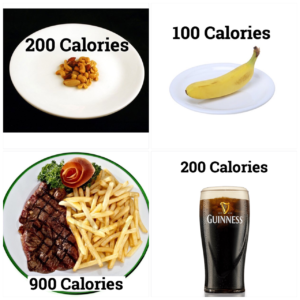
Scenario 2: Workout Day
Lunch at 12:00pm (400 calories total)

Snack at 4:00pm (300 calories total) to fuel up before the gym
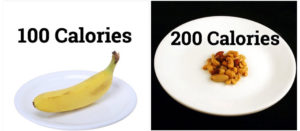
Dinner at 8:00pm (1300 calories total)
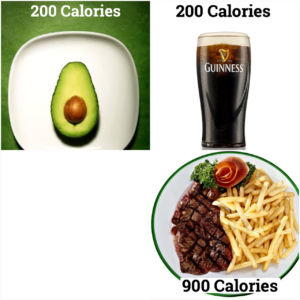
Scenario 3: Party Time, Save More Calories for Dinner
Small Snack at 12:00pm (100 calories total)

Another Snack at 4:00pm (200 calories total)

Big Dinner with Friends at 8:00pm (1700 calories total)
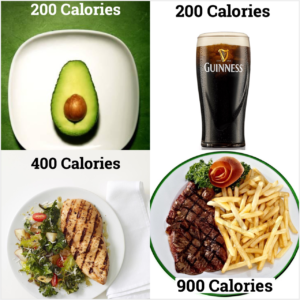
My Clients Who Implemented Intermittent Fasting

| Georgiana used Intermittent Fasting to help her stay in a calorie deficit. As a busy architect she used to travel to customer sites across Canada. So fasting worked well for her naturally since there was never a set time for her to eat. She lost 20 pounds in 12 weeks working with me with zero exercise. And in total she is down 30 pounds and has been maintaining for 2 years.
|
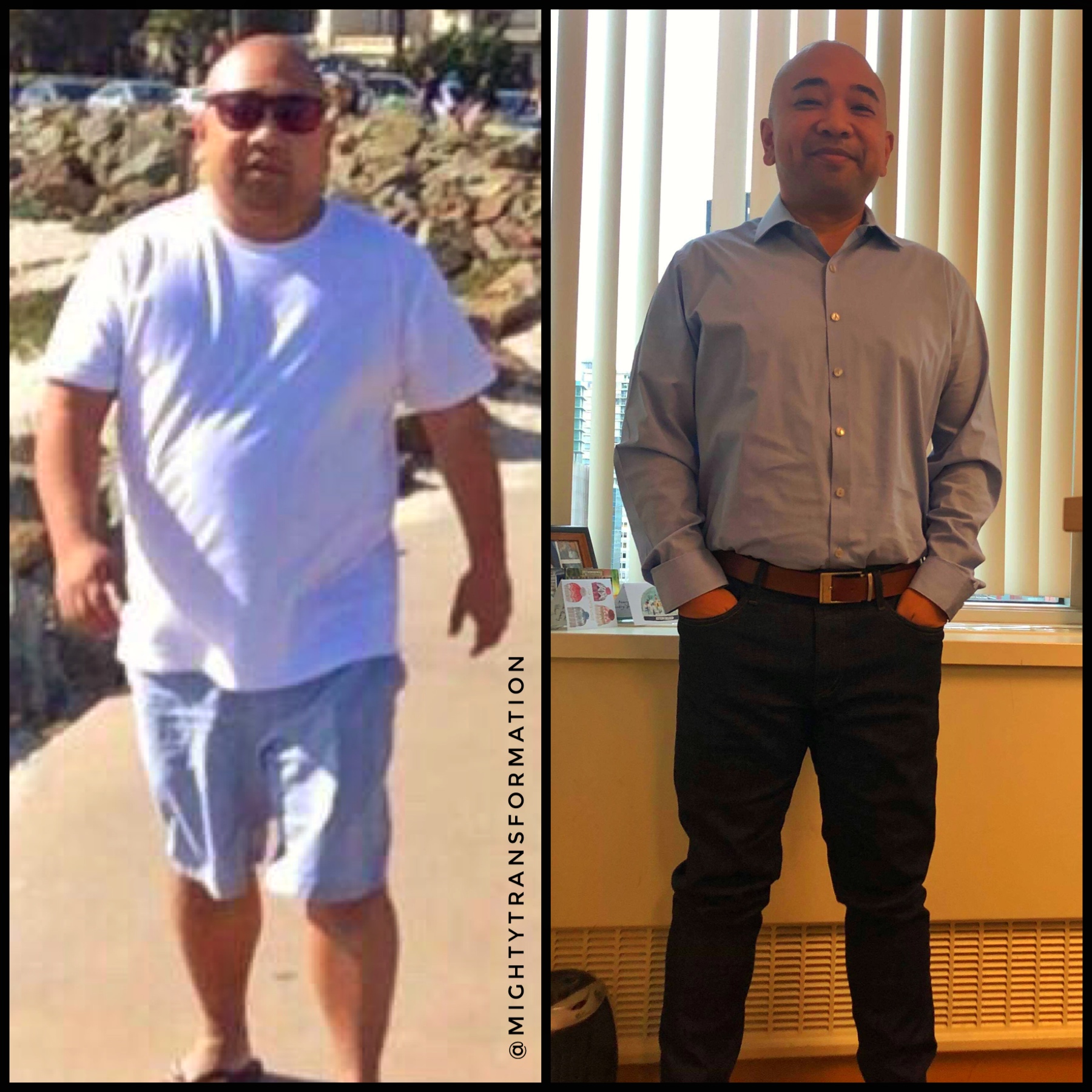
| Arnold lives in Vancouver and he is a big foodie. A restrictive diet would not work for him so by implementing Intermittent Fasting, it allowed him to enjoy all the foods he loved while still losing weight and without relying on exercise. He lost 50lbs in 12 months and all his health markers improved dramatically!
|

| Olga lives in Paris and loves her desserts. There was no way she was going to restrict herself, but it can be hard to be on a weight loss journey with all those temptations. So she used Intermittent Fasting to budget her calorie intake and make her treats fit her plan.
|

| Susan lost 25lbs in 12 weeks working with me. She is a busy real estate broker always on the go and Intermittent Fasting worked naturally for her lifestyle. She is now down 30lbs being consistent with this approach.
|

| Rob used Intermittent Fasting to help control his food intake. Even as a diabetic he was able to implement Intermittent Fasting under supervision from his doctor and frequently checking his blood sugar level. Amazingly he was able to reduce his medication and eventually eliminate Metformin. He lost over 100lbs in a year’s time. Rob has maintained his progress since 2016.
|
Thank you so much for attending! If you have any questions on Intermittent Fasting or the Mighty Transformation program please email me at trainer@MightyTransformation.com or send me a message on Facebook. Add me as a friend by clicking here.
You can also join my free Facebook community here.